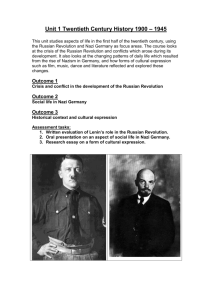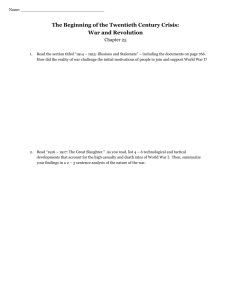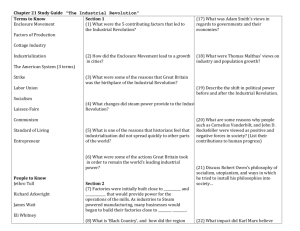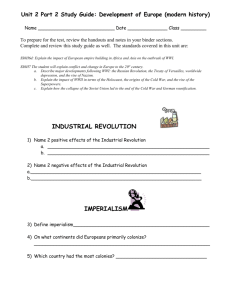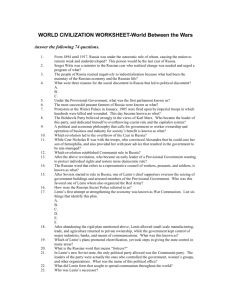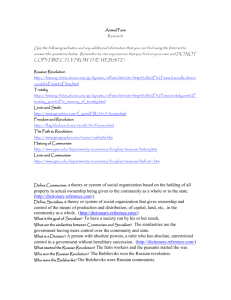Russian Revolution & Vladimir Lenin Packet #25 S. Gerhardt Global
advertisement
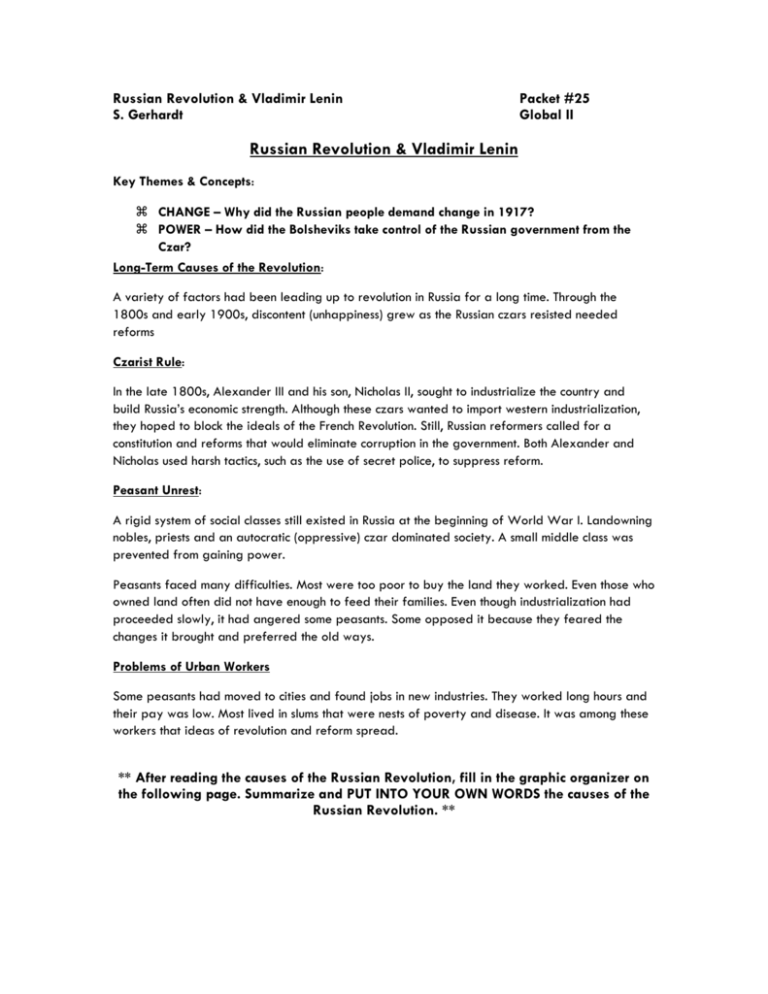
Russian Revolution & Vladimir Lenin S. Gerhardt Packet #25 Global II Russian Revolution & Vladimir Lenin Key Themes & Concepts: CHANGE – Why did the Russian people demand change in 1917? POWER – How did the Bolsheviks take control of the Russian government from the Czar? Long-Term Causes of the Revolution: A variety of factors had been leading up to revolution in Russia for a long time. Through the 1800s and early 1900s, discontent (unhappiness) grew as the Russian czars resisted needed reforms Czarist Rule: In the late 1800s, Alexander III and his son, Nicholas II, sought to industrialize the country and build Russia’s economic strength. Although these czars wanted to import western industrialization, they hoped to block the ideals of the French Revolution. Still, Russian reformers called for a constitution and reforms that would eliminate corruption in the government. Both Alexander and Nicholas used harsh tactics, such as the use of secret police, to suppress reform. Peasant Unrest: A rigid system of social classes still existed in Russia at the beginning of World War I. Landowning nobles, priests and an autocratic (oppressive) czar dominated society. A small middle class was prevented from gaining power. Peasants faced many difficulties. Most were too poor to buy the land they worked. Even those who owned land often did not have enough to feed their families. Even though industrialization had proceeded slowly, it had angered some peasants. Some opposed it because they feared the changes it brought and preferred the old ways. Problems of Urban Workers Some peasants had moved to cities and found jobs in new industries. They worked long hours and their pay was low. Most lived in slums that were nests of poverty and disease. It was among these workers that ideas of revolution and reform spread. ** After reading the causes of the Russian Revolution, fill in the graphic organizer on the following page. Summarize and PUT INTO YOUR OWN WORDS the causes of the Russian Revolution. ** Russian Society French Society After examining the two cartoons, please describe how BOTH the French and Russian society structures contributed to the outbreak of violent revolution. NOTES: Main Ideas & Themes Notes Lenin’s View on Marx • Lenin, as a young man, read the works of Karl Marx • Lenin adapted Marxist ideas to fit Russian conditions • Spread Marxist ideas among factory workers The Bolshevik Take Over: • Lenin ordered that all farmland be divided among the peasants and ended private ownership of land • Bolsheviks took control of the factories, mines, banks and railroads. • Created a new flag Russia Plunges into Civil War: WHO? Reds (communists) Vs. Whites (Supporters of the Czar) • The Allies intervened and wanted whites to overthrow the Communists • Communists used terror not only against Whites , but to control their own people • They organized the Cheka - a secret police force • Communist forces were able to defeat the White Army USSR aka the Soviet Union • 1922, Lenin’s government helped unite Russia into one union • Soviet Union was a multinational state made up of European and Asian peoples New Economic Policy aka NEP • New policy allowed some capitalist ventures • State still controlled banks, foreign trade and large industries • Allowed small businesses to reopen for private profit and peasants to freely sell their surplus crops Stalin Takes Over: • Lenin died in 1924 (age 54) • There was a power struggle within the Communist party……. Stalin comes out on top • Promises to return to a “pure” communist state WRAP-UP & REVIEW: Speaker A: If the rate of population growth continues to exceed the growth in the food supply, there will not be enough food for all of the people. Speaker B: There are people who are wealthy and people who are poor. This is just how things are. Speaker C: History is the story of class struggle. Eventually, the working class will rise up and revolt against the wealthy. Speaker D: The government should do what is best for most of its people. Which speaker best represents the views of Karl Marx? (1) A (3) C (2) B (4) D To which situation are these speakers most likely reacting? (1) growth of Zionism (2) rise of industrialization (3) division of Africa (4) formation of military alliances A key principle of the economic theory of communism is (1) restoration of a bartering system (2) organization of workers’ unions (3) government ownership of property (4) privatization of business Which event had the greatest influence on the development of laissez-faire capitalism? (1) fall of the Roman Empire (2) invention of the printing press (3) Industrial Revolution (4) Green Revolution • Led the Russians in a second revolution (1917) • Promised “Peace, Land, and Bread” • Established the New Economic Policy (NEP) Which leader is being described by these statements? (1) Czar Nicholas II (3) Vladimir I. Lenin (2) Nikita Khrushchev (4) Mikhail Gorbachev Which idea is most closely associated with laissezfaire economics? (1) communes (2) trade unionism (3) subsistence agriculture (4) free trade In The Communist Manifesto, Karl Marx and Friedrich Engels expressed the idea that (1) religion should be the most important factor in society (2) power should be determined by a person’s wealth (3) profits from work should belong to the workers (4) supply and demand should control prices Adam Smith would most likely agree with which statement? (1) Revolution is the only solution to economic problems. (2) Five-year plans are necessary in order to industrialize. (3) All nations would benefit from an agricultural economy. (4) Government should follow a laissez-faire policy. Laissez-faire economists of the 19th century argued that (1) the government should regulate the economy and foreign trade (2) individuals should be allowed to pursue their self-interest in a free market (3) governments should develop a state-run banking system to prevent instability (4) anarchy would result if universal male suffrage was granted Laissez-faire capitalism as attributed to Adam Smith called for (1) heavy taxation of manufacturers (2) strict government control of the economy (3) minimal government involvement in the economy (4) government investments in major industries Karl Marx predicted that laissez-faire capitalism would result in (1) a return to manorialism (2) a revolution led by the proletariat (3) fewer government regulations (4) an equal distribution of wealth and income

